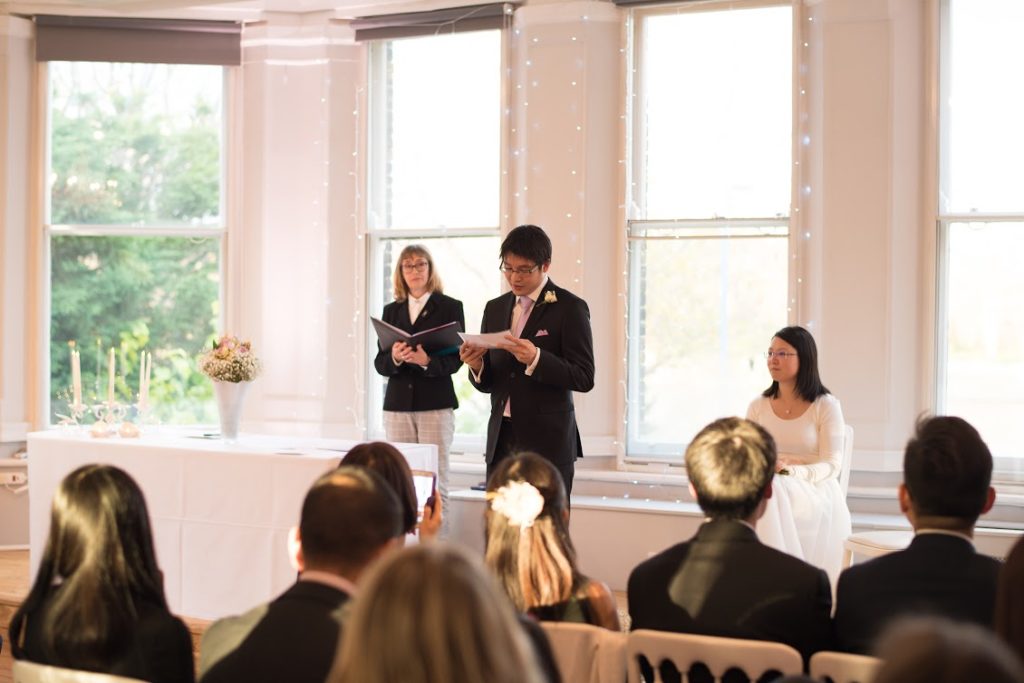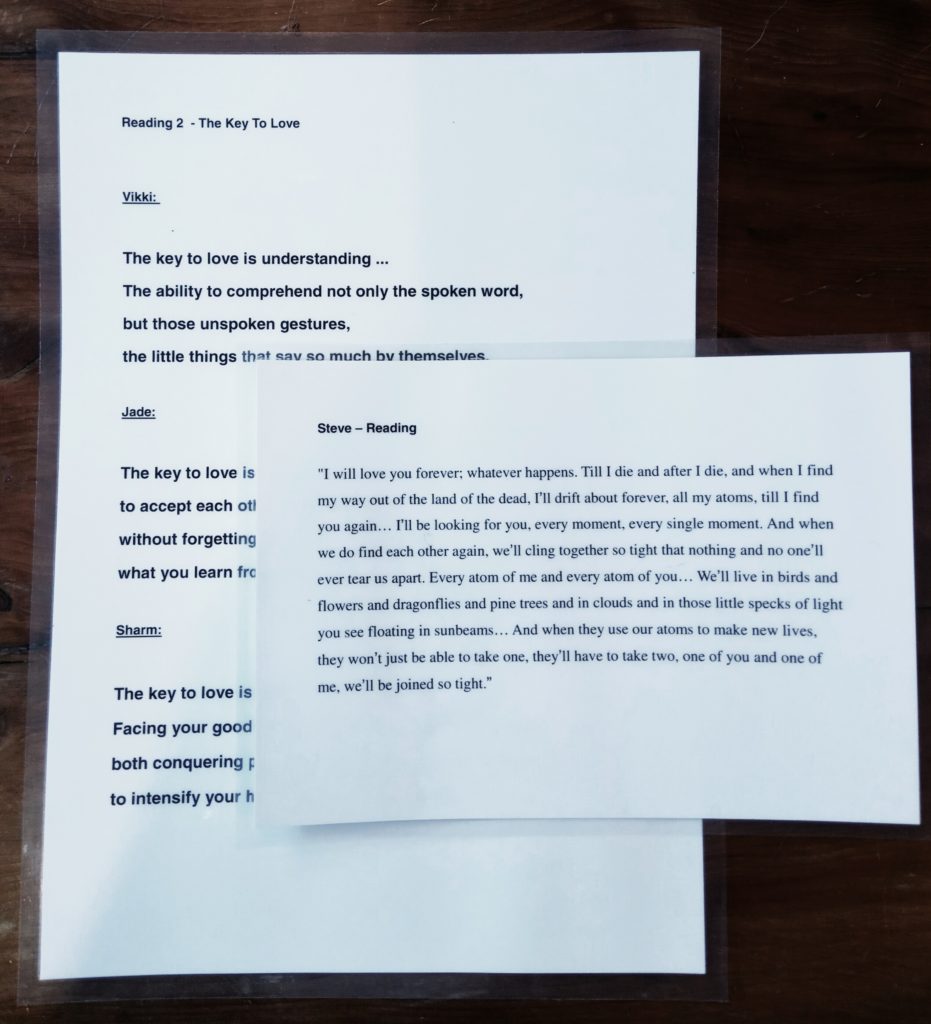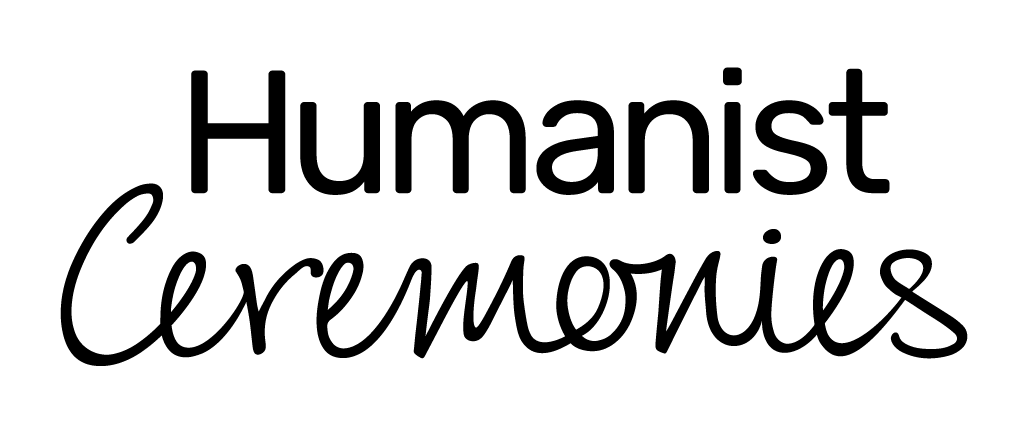Choosing readings for your humanist wedding ceremony

The groom (Steve) reads as Yiming looks on. Photo credit: DR Photography
One of the great things about choosing to have a humanist wedding ceremony is that you – the bridal couple – can create a unique wedding ceremony that truthfully represents your personalities, your values, and your hopes for your future life together. You have total control and final say over the various elements of the ceremony.
When couples first approach me to talk about a wedding, some already have a good idea of want they want to include in the ceremony but many wish to talk through all the possible elements including music, personal vows, hand-fasting or other cultural or symbolic act, and readings.
Having one or two readings in the ceremony can be wonderful way to express feelings about love and marriage. Readings can also be a lovely way to involve family members or close friends in the ceremony. Readings can also help to build anticipation during the ceremony and add an extra dimension of ‘performance’.
So … here are a few things to keep in mind when choosing readings for a humanist wedding ceremony
Choose something that means something to you
Readings can be favourite poems, letters, extracts from books, famous quotations, song lyrics, even dialogue from a film or play. My advice is that whatever you choose it must be meaningful. There’s no point choosing something just for the sake of it, or because you’ve seen it listed on the internet as a popular wedding reading.
Your humanist wedding celebrant will be more than happy to help you find suitable readings. It might work out that you don’t need a reading at all.
There are many websites that list ideas for wedding readings – the choice can sometimes be a little overwhelming. Here are three links that might help you start to narrow down those choices:
- Plan Your Perfect Wedding has a list of funny wedding readings
- Loverly has a list of non-traditional readings, and
- Rock My Wedding has an eclectic mix of romantic, quirky and classic readings.
Think about who will be doing the reading
Many couples choose to have a beloved relative or close friend do a reading. If you’re choosing the reading for them – my advice is to think carefully about what would suit them. If they’re not used to public speaking having to read a long poem or song lyric may be too stressful. Choosing something short, or funny may be a better option.
Some couples ask their readers to choose the readings themselves – some even ask their readers to keep the choice secret until the ceremony itself. This can be a good way to avoid having to make the decision yourselves! And can also inject an element of surprise for the couple.
However, I’d advise you ask your humanist celebrant to liaise with the readers to ensure their choice is consistent with the tone of the ceremony and to run through any issues the reader might have.
Some couples to find it difficult to choose who do the reading, or have too much choice! One solution is to ask your celebrant to do the reading. Alternatively, some couples choose to do the readings themselves (see image above). Another option is to get several readers to share a reading – taking a verse or two each. One couple I married both had Welsh heritage so chose to ask the groom’s mother to read a poem in Welsh. An English translation was then read afterwards by the bride’s cousin.
You might even consider getting all your guests to stand up and read something together at a particular point in the ceremony – you could have the words printed up and left on the seats.
I bring laminated copies of the readings to the ceremony – they look nicer than a crumpled piece of paper, and also if anyone has forgotten to bring their reading we know we have a spare.

Laminated readings are useful at wedding ceremonies.
Don’t have too many readings
Ideally, I’d recommend one or two readings. It’s important to think about what they add to the ceremony. Too many readings can become tedious for your guests and slow the natural pace of the ceremony, which should build anticipation towards the exchange of vows and rings.
That said, the couple who chose the Welsh poem (see previous section) actually had four readings. This worked for them as they didn’t want to have so much of their personal story told as part of the ceremony. The readings they chose expressed how they felt about each other and ranged from serious to quirky.
Practise, practise, practise!
It’s important that whoever is doing the reading/s should practise reading the piece out loud several times before the day itself. Reading it through helps you get familiar with the material and this will make your reading more confident. Poems can sometimes be quite tricky with varying rhythm and odd line breaks. Knowing when to take a breath is vital!

